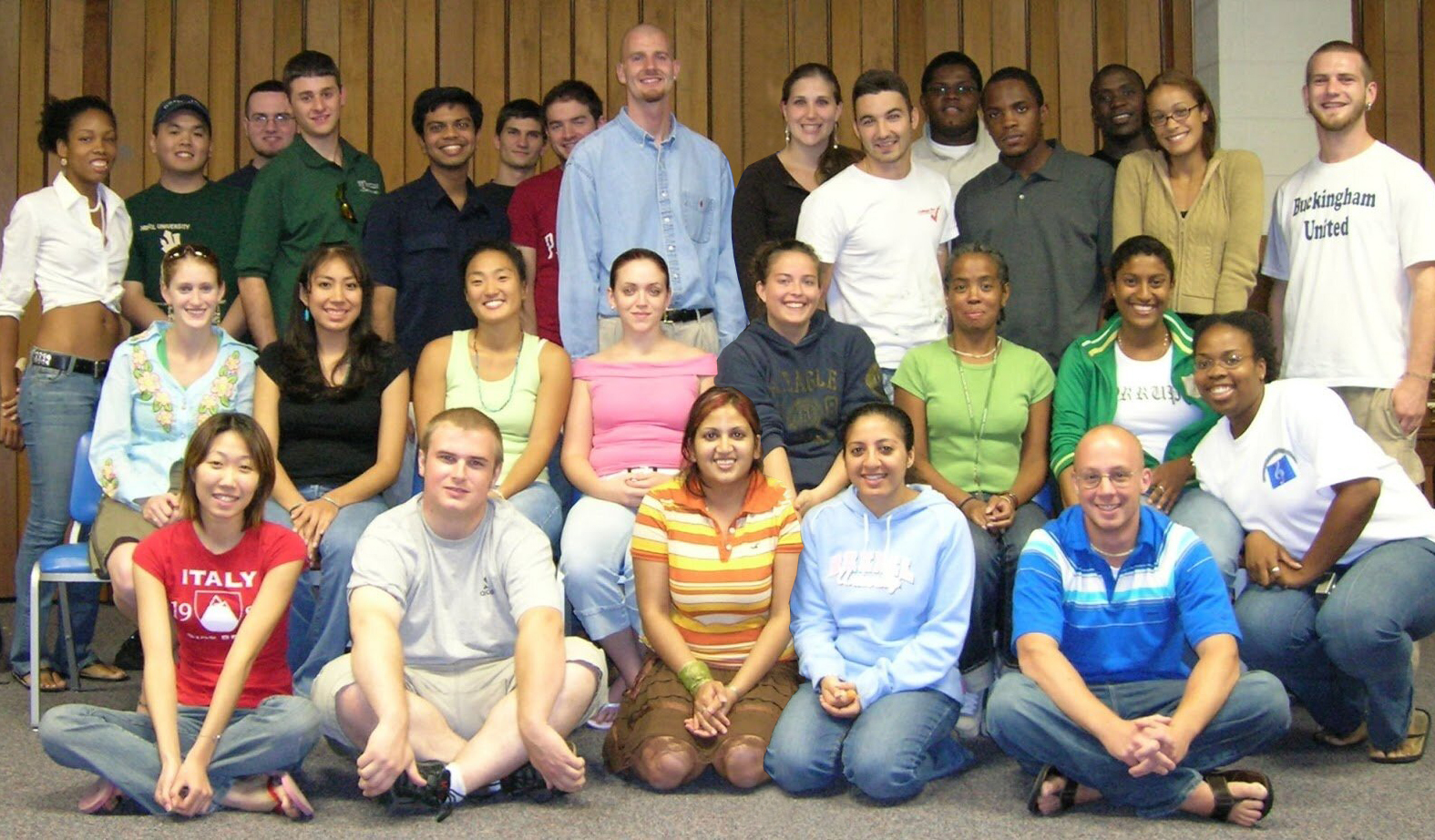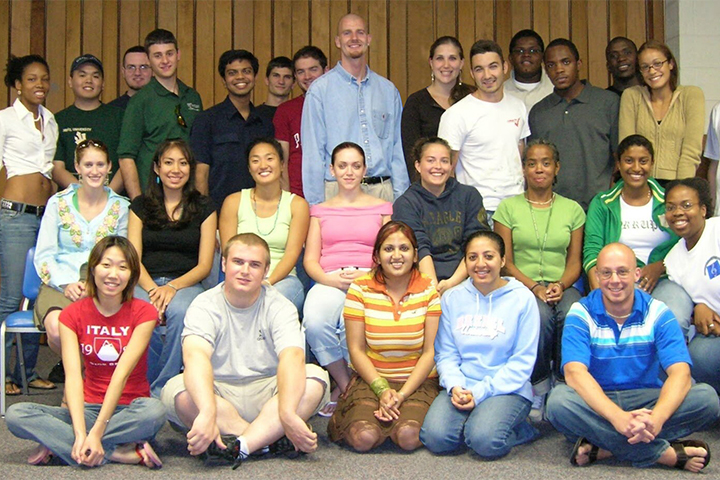
Participants in the first Culture of Respect cohort at Drexel, from 2005. (Maiden names are indicated in parenthesis.) Back row, left to right: Morgan Taveras (Decaul), Quoc Nguyen, Sean McCole, John Rizzo, Nithin Michael, Ben Guez, John Rans, Philip Poczik, Jessica Perkins (Livingston), Pete Briglia, Donald Ken-Worgu, Kenneth Ken-Worgu, Anire Okorodudu, Dr. Ilana Harms (Dyson), Kyle Weinberger. Middle row, left to right: Liz Fenster (Solomon), Verdaleen Denetdale, Chong McLaren, Amanda Zdradzinski, Nicole Wood, Karen Smith, Dr. Deb Jayaratnam (Kharson), Zeeley Stewart. Front row, left to right: Dr. Na Jen, Travis Himes, Priya Deka, Shilpa Gadhok, Craig Bruno.
In 2005, Morgan Taveras ’06 first met the man who would alter the way she viewed herself and the world.
Back then, she was one of the few African American women enrolled in Drexel’s biomedical engineering major. At a gathering of the National Society of Black Engineers, she noticed a young, white man. Philip Poczik introduced himself as Drexel’s coordinator of multicultural programs. Then Taveras saw him at a Society of Women Engineers meeting.
“What’s this guy’s definition of culture?” she wondered. “I was so intrigued by how he spoke about identity.”
When Poczik asked her to help facilitate a new elective that he promised would explore identities in mind-opening ways, Taveras enthusiastically agreed. Called “Culture of Respect,” the 10-week, Pennoni Honors College elective open to any Dragon used students’ personal stories as textbook, Poczik explains, tackling a range of isms: sexism, racism, heterosexism, ageism, ableism, classism and religious oppression. The experiential-learning course that Poczik launched at Drexel in 2005 was inspired by a course that Poczik had taken as an undergraduate at Hobart and William Smith Colleges in upstate New York. For three years, Poczik and more than 50 student “teaching colleagues” that he trained to facilitate the course taught 11 consecutive terms. By the time “Culture of Respect” ended in 2008, when Poczik left the University, 100 students were enrolled each term and it had become one of the most popular classes at Drexel.
“It became a movement,” Poczik recalls.
“It was mind blowing,” says Taveras, 40, a freelance curriculum designer who lives in Puerto Rico. “I was an engineering student. I cared about numbers, facts, performance. I hadn’t ever considered people’s feelings as a valid source of data.”
Now, nearly two decades later, she and 24 other Drexel alumni who say they were transformed by the anti-oppression course are building, along with their former instructor, a small business with an outsized mission: To change the very environment of the work world. With evangelical zeal, Poczik and the alumni argue that their new, online incarnation of the Culture of Respect (CoR), like Drexel’s original class, fosters belonging — a word it defines as “to be seen, understood and valued without needing to change yourself” — and call it essential to a successful workplace.
Initially relaunched in 2020 in the wake of George Floyd’s murder, CoR was envisioned as a path forward for a country divided over how to respond to calls for social justice.
“Unfortunately, many let that incident end friendships and work relationships because we weren’t willing to listen to each other,” says CoR participant coordinator Létitia “Tisha” A. Crippen ’07, who took the class when she was a commerce and engineering major at Drexel and together with other alumni reached out to Poczik about restarting it. “I knew if more people would understand oppression across all spectrums, there would be more unity and we would be kinder and more understanding toward each other.” That’s because CoR emphasizes building trust and empathy among diverse participants through the sharing of personal experiences around the isms, leading to an awareness that often translates to more inclusive practices in the workplace, the organizers say.
The deeply polarized political climate, where hard-won DEI efforts have been rolled back, has presented challenges, for sure, but the venture’s leaders remain undaunted. They argue that the times demand a CoR and its core value of respect, encapsulated in its logo of two clasped hands with the motto Teaching People Why We Should Value Each Other’s Lives.
“On the surface, we can look different,” says CoR founder and lead facilitator Poczik, 45, “but we can have shared experiences across culture and race and religion. The belonging piece for me is key to all of it.”
According to the EY Belonging Barometer that CoR cites, more than 40% of Americans feel emotionally and physically isolated at work. On the flip side, a high sense of belonging has numerous benefits: a 56% jump in job performance, a 50% drop in turnover, a 75% reduction in sick days and a 167% increase in employee willingness to recommend their employer to others, according to a 2019 study by coaching platform BetterUp.
“Belonging is how we feel,” says Poczik, who now works at Union College in Schenectady, New York, as director of two education opportunity programs.
“When I walk into my place of work, do I feel valued, respected, appreciated? Do I feel people are sensitive to the identities I bring into this workplace?”
When the answer is yes, good things can happen. CoR facilitator coordinator Craig Bruno ’07, 40, a commerce and engineering graduate who helped teach the course when it was offered at Drexel, recalled how as the new operations manager for a Seattle-area security firm, he set out to improve diversity on the all-male, almost all white team of 20 he inherited. Over a few years, Bruno says his team added five women, several men of color and two openly LGBTQ people. “By sending the message that everyone was welcome and backing those words with action,” says the now stay-at-home father who lives in Havertown, Pennsylvania, “I was able to affect real change.”
Taveras, CoR co-founder and curriculum director, says the Drexel course opened her eyes to “the layers of oppression” that she faces beyond being a Black woman. She grew up working class (classism), she has a disability (ableism), and she’s bisexual (heterosexism).
“I found myself constantly reminded that I was not valued by society,” she says. The revelation ultimately changed her career trajectory, says Taveras, who sought out a role as a high school biology teacher in New Orleans where she could prioritize a welcoming classroom to bond with her students.
“You can’t come out of ‘Culture of Respect’ and look at people who are different than you and see them as a threat, as something to be otherized and diminished,” she says. “That’s why I’m so passionate about it.”
But convincing the business world of CoR’s value hasn’t been easy. It isn’t a quick fix, after all. But it is a potential individual and tangible solution to ending oppression — or at least making a serious dent, argues Poczik.
CoR’s main activity divides participants into “included” and “excluded” discussion groups based on the week’s “ism.” For example, if the topic is classism, those who grew up working class would be in the excluded group, or if it’s religious oppression, Christians would be in the included group. There they share personal experiences and then come back together to explore insights.
Initial interest was good, Poczik says, but more recently, prospective clients have balked at the flagship course’s 25-hour time commitment over 10 weeks and the $750 to $2,000 a person cost before need-based scholarships. CoR has added two-hour Zoom workshops ($2,850) on building belonging that have attracted clients such as the CUNY School of Professional Studies, OIC of America, Fear Free Pets and the Philadelphia Energy Authority. The venture also has a series of free lunch-bag sessions for former participants and the public that cover “Parenting Through Oppression,” “Exploring Work Trauma” and other topics.
Society, too, has dramatically shifted. The outpouring of solidarity in the wake of George Floyd’s murder framed diversity, equity and inclusion as critical to national healing, but the topic quickly became a political hot button, making CoR’s sales pitch more difficult. “DEI in many spaces is a dirty word,” Poczik says.
That’s why CoR emphasizes belonging and improving relationships between people and focuses on personal narratives, he says. In a 2021 article in the Stanford Social Innovation Review, the University of Florida authors noted: “Great stories help us understand systemic issues because they transport us into the lives of the characters. We see the world through their eyes, and we are changed by their experiences because they feel like our own.”
Consider these perspectives on the CoR experience:
“As a person of color and woman, I’m often in the minority, in the oppressed group,” says Shonique Banks, 49, partner at the Strategic Impact Group in Newark, New Jersey, who took the course in 2022 when she worked at the quasi-government Philadelphia Energy Authority. “Here the tables turned. As a Christian, I was in this privileged group. My allies looked different. It wasn’t another Black woman or Black man. It was a white woman…. It spoke to the ability to be both the oppressed and the oppressor — and to consciously work against that and be an ally.”
The revelatory experience led Banks to write a broader job description for a manager opening, emphasizing experience over advanced degrees. “I could be excluding many people just by how I write the job description,” she says. “In turn, excluding a talent pool oppresses a group of people by limiting access.” Banks says she hired an experienced, older woman with a bachelor’s degree who has since moved up the ladder.
Senior medical director and ER physician Stuart Solomon, 73, was skeptical of CoR at first. But his daughter Elizabeth (Solomon) Fenster ’07, who had taken “Culture of Respect” while studying fashion design and merchandising at Drexel, urged him to try it, saying it was life changing for her. “I would end up using the same words,” he says, in part because of insights into himself and his relationship with others.
As a white man, Solomon says he expected to mainly listen to those in excluded groups. Instead, he shared his experiences with ageism, saying colleagues often ask him, “Hey, Dr. Solomon, how long have you been here?” What they really mean, he says, is that he’s been there too long. “When someone says they’re Black or trans, or whatever the situation is, you realize it’s not just a term. This is 20 or 30 years of discrimination or pain.”
During the CoR 2021 pilot course, Morgan DiLeo, an assistant professor of ophthalmology at the University of Pittsburgh, told the group about coming out as bisexual later in life, after being married to a man. “I felt brave,” she says. Since then, DiLeo has incorporated a CoR essential into the course she teaches: the one-word check-in. At the start of each class, just like the start of each CoR session, she asks students to share a single word that captures how they are feeling that day. It could be tired or curious or rushed. It gets every student to speak at least one word, she says, and helps her learn names and personalities. “Even if you’re teaching an engineering course,” she says, “all those things help students know that they can trust you.”
For Karen Sams, the executive assistant to the dean of the Pennoni Honors College, the most valuable aspect of the course she took as an employee back in 2005 was the safe space it provided to learn about other cultures and herself and to ask questions “about the work I needed to do,” says the 62-year-old from Glenolden, Pennsylvania. “It’s ongoing life work.”
Drexel Vice President and Chief Diversity Officer Kim J. Gholston says the venture echoes what she regularly imparts to the campus community. “When you’re able to provide spaces for people to start being comfortable being uncomfortable — so they can admit ‘I don’t know what terms to use,’ or ‘I don’t know if this will be offensive,’ or ‘I just don’t know,’” she says. “Then we’re talking about creating a culture of respect, and that’s beneficial to everyone.”
By all accounts, CoR’s success — both as a Drexel course and now as a business — rests largely in Poczik’s infectious enthusiasm and sincere anti-oppression commitment.
Mark Greenberg, who was dean of Pennoni Honors College when Poczik proposed “Culture of Respect,” says the material and the way it was presented was ahead of its time — and quickly became a favorite among students. “Such a course is expressing certain values, ways of looking at other people,” the distinguished university professor and provost emeritus says. “When not done well, it can become preachy, oppressive, narrow. Philip had the capacity to pull it off because of who he was — the real deal…. He didn’t lecture. He stimulated conversation.”
Poczik — who identifies as a middle-class, white, heterosexual male — says he first became aware of the depth of oppression in American society as an undergraduate taking “Culture of Respect,” which his college adopted from Cornell University, where the course originated. In one pivotal assignment, he says he wasn’t able to see similarities between himself and the story of a young, Muslim, Afghan immigrant woman struggling to find her place in America. The professor asked him if he had ever struggled, ever faced a significant change? Poczik thought of his transition to college, which wasn’t easy, and his polar-opposite roommate.
“It truly was an epiphany,” he recalls. “So much of systemic oppression is done by people who look like me and possess my identities. I feel an obligation that I have a role to play. You need the oppressed and oppressor working in lockstep together, if you’re ever going to dismantle systems of oppression.”
CoR reveals the gaps in one’s “inclusive walk” and ways to close them, says Crippen, 39, who also owns Touch Management in Fairless Hills, Pennsylvania, where she lives. It’s not about political correctness, though. “What we want you to understand is that your words have impact on people,” she says. “The only way to know that is to hear all the different perspectives.”
“Who’s a reader?” Poczik asks on this March afternoon during a Zoom call with 25 employees of the scholarship and workforce development nonprofit Say Yes Buffalo in New York. “Who’s a gamer? Who’s a dancer?” For each question, the participants turn their camera on for yes and off for no.
The activity, called “Who’s here?”, recognizes the many identities within a group, Poczik says, and helps break down barriers. For 45 minutes, the questions keep coming, getting increasingly more personal. “Who speaks a language other than English?” The screen turns to black boxes except for two faces. “Whose family has experienced divorce?” Half the boxes light up. “Who’s gender nonconforming?” The entire screen goes black.
Poczik calls out questions covering religion, disabilities, sexuality. The final set home in on belonging — the day’s topic. “Who has felt judged based on appearance or the identities you possess?” Twenty-four of the 25 cameras flash on. “Who has judged someone else based on appearance or the identities they possess? Twenty-three cameras stay on.
The participants break into two smaller groups to discuss the last questions, then the participants come together again to talk about the importance of getting to know each other’s identities rather than operating on assumptions.
Point person Tanya Staples, SYB’s senior director of community schools, says the workshop, offered at no cost to the nonprofit, “was a sampler … not a deep dive.” Still, she added, “we learned about our colleagues. I now have an appreciation for where people are coming from, the differences that people bring to the table” and she’s eager to seek funding for the full experience.
Says Poczik: “We’re not going to solve all the equity and diversity problems in the world in two hours, but it’s a start.” Learning about each other, however small it may seem, lays the foundation for a culture of respect that can persist in an organization, that can result in a more inclusive job description, a more welcoming workplace, a more empowered employee, he argues.
“It’s a way of looking at people holistically, beyond just the labels they have,” he says. “It’s those kinds of awakenings that enable tangible change.”



